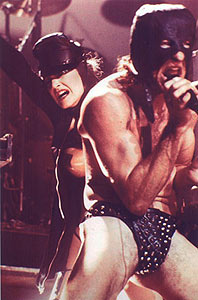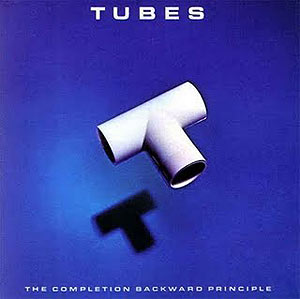A Guide For Getting Into: The Tubes
Published on November 29th, 2009 in: Issues, Music, Retrovirus |
Re Styles and Fee Waybill
performing “Mondo Bondage”
London 1977
Photo © The Tubes Project
The A&M records tend to best reflect the Tubes’ roots as well: a cabaret-rock band that had a full-on stage show with characters, costume changes, comedy bits, and, as it turns out, insanely talented musicians and songwriters. These records all tend to feel like a complete statement, even though the only real “concept” album of the bunch is Remote Control, about TV’s influence on culture.
While the rest are non-thematic collections of songs, they all FIT together; each individual song is great, but they’re all bolstered by one other. Perhaps this is why the A&M-era Tubes never really had any smash singles. While “White Punks on Dope,” for instance, or “Prime Time” are known and pretty influential, they weren’t exactly “Talk To Ya Later” or “She’s A Beauty.” Principle aside (and more on that in a bit), the Capitol records all feel like greatest-hits collections of songs that hadn’t actually been hits yet; this isn’t necessarily a bad thing, but it’s not typically as rewarding a listen from top to bottom.
This lack of number-ones-with-or-without-bullets is what caused A&M to reject the band’s (still unreleased) follow-up to Remote Control, Suffer For Sound. “Drivin’ All Night” was the only song that made it, and was released on T.R.A.S.H., to finish off The Tubes’ A&M contract. They ended up going over to Capitol, and everything looked like it’d be the same.
After all, their first album was going to be a jokey concept album: The Completion Backward Principle was officially based on a book with that title of how to write a best-selling album (shades of the “how to have a hit single” instructions found in The KLF’s The Manual about ten years early) but, as the title hints, the “completion backward principle” was to take hit records of the day and re-write them enough to be different. And it makes sense: occasionally I listen to ’80s radio and I have been struck by how songs of that time were successfully parodied by The Tubes on the album. The artwork even presented the band as “The Tubes Group” in suits and ties, looking like an architectural firm, which in this case, they kind of were.

While The Completion Backward Principle holds up for the most part, it sounds dated, unlike their A&M releases. But that makes sense since most disposable pop of the ilk Principle was parodying sounds dated when removed from its specific time and place. Honestly, for the most part, the songwriting was as strong as it was before; after all, this was the album they were promoting on that SCTV appearance, and it was enough to hook me! The album sputters a little bit at the end, but there are a lot of great cuts; even aside from the singles, there’s the goofy “Sushi Girl,” “A Matter of Pride,” and “Amnesia.”
Unfortunately, The Completion Backward Principle succeeded TOO well. Whereas with A&M, each album had built on the previous and been a departure in some aspects, the next album, Outside Inside was very much the same, just minus the irony that made The Completion Backward Principle work. The Tubes were paired with the same producer, David Foster (of whom, I’m, ahm, not a fan). While Outside Inside had some good cuts—including “Tip of My Tongue” and the HUGE hit “She’s A Beauty” —a lot of it just seemed kind of phoned-in. “Wild Women of Wongo” is admittedly catchy, but a shameless attempt to keep the “See, we’re goofy and funny!” cred of their A&M-era fans. Looking at the track listing, a lot of it is just forgettable; I couldn’t remember most of the songs without queuing them up.
The follow-up to that should have been really good; one would hope Capitol would be throwing money at The Tubes to make a great record after the success of “She’s A Beauty.” They’d even been re-paired with Todd Rundgren, who produced Remote Control, my favorite of the Tubes records. Sadly, Love Bomb wasn’t. It’s quite terrible, actually. Like Genius of America, I’ve struggled to get through it and failed many times. I think I’ve finally been able to listen to the entire thing once. What happened?
2 Responses to “A Guide For Getting Into: The Tubes”
January 16th, 2012 at 12:01 am
I still have The Tubes self titled album and Young and Rich, of course in Vinyl. I feel those were the best from the Tubes and maybe the “real” music the way the Tubes wanted it. “What Do You Want From Life”, “Dont Touch Me There”, “White Punks On Dope” are still timeless classics to me.
March 27th, 2017 at 4:23 pm
[…] the Tubes once sang, TV is king — and television in 2015 is no exception. There were a ton of great series […]
Time limit is exhausted. Please reload the CAPTCHA.